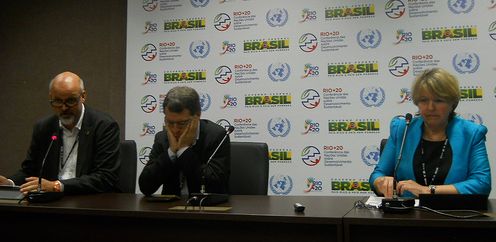By Claudia Ciobanu
RIO DE JANEIRO, Jun 21 (TerraViva) – NGOs present at the Rio+20 conference complain that they were only consulted on the official document at the last minute, when they could no longer make a significant impact.

Representatives of WWF, Greenpeace and Oxfam criticise the final text and exclusion of NGOs from negotiations Thursday, June 21. Credit: Claudia Ciobanu/IPS
Speaking during the opening ceremony of the official segment of the Rio+20 conference June 20, when heads of state were supposed to rubber-stamp the final document presented by Brazil, a representative of NGO groups present here said that “the text is completely out of touch with reality and NGOs at Rio do not endorse this document.”
The NGO representative (identified as Waek Hamidan from Climate Action Network Europe by Brazilian media) said that the text was a failure because it did not address crucial issues such as ending support for fossil fuels and nuclear power, or taking clear steps to address high seas destruction.
He asked that, if the text remains as it was presented Tuesday, mentions of civil society being part of drafting it be removed from the introduction to the document.
NGOs present in Rio have all expressed deep disappointment with the final document, though they do not all necessarily agree with the call to strike out mentions of the text being elaborated together with civil society.
Barbara Stocking, chief executive officer at Oxfam, told TerraViva on June 22 that her organisation supports eliminating the civil society reference from the final text.
“Basically, civil society does not stand with that set of declarations,” Stocking said. “The basics are there, but there is nothing in it really that civil society has been strongly pushing for. There was no proper process of how civil society could be engaged.
“The dialogues took place just in advance of the actual high-level part of it but there has been no real means to bring that in because the actual text was closed by the time that was finished.”
But Sharon Burrow, secretary general of the International Trade Union Confederation, took a different approach. “I support the ambition and the views, but my challenge is not to remove us from the text but to clarify what co-determination (co-decision) really means when we move forward,” Burrow said.
“We, civil society, trade unions, represent the people and so do politicians. They presented us with a final text on the eve of the summit, that was most frustrating. But it’s not about a word in the text, it’s about the fact that if they’re serious about co-decision, they have to tell us how we will be involved, tell us what is the timeline.”
Kumi Naidoo, head of Greenpeace International, told TerraViva that leaving civil society in the text or not is a theoretical question at this point, as no further changes will be made and the majority of civil society finds the document clearly inadequate and lacking in ambition.







 Add to Google
Add to Google







